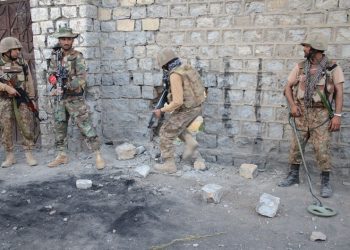Pakistan Tehreek-e-Insaf (PTI) Chairman Imran Khan on Friday filed a plea in the Supreme Court seeking post-arrest bail in the cipher case.
In his 18-page bail plea, the PTI chief, through his counsel Barrister Salman Safdar, has put before 15 legal questions regarding the cipher case.
Among the questions, Khan wants the Supreme Court to consider whether the courts that rejected his bail plea took into consideration that the cipher case was “politically motivated”. He also questioned the role of the Federal Investigation Agency (FIA) jurisdiction in the case and its “malafide intentions and ulterior motives”.
“Whether Ministry of Interior correctly assumed the role of Complainant excluding Ministry of Foreign Affairs which actually handles ‘Cypher Telegram’ & Whether the Minister of Interior under whose direct supervision Federal Investigation Agency (FIA) operates was not a Political Opponent of the Petitioner?” asked Khan.
The petition also wants the top court to determine whether the Islamabad High Court (IHC) “failed to properly understand and appreciate that the petitioner as Prime Minister of Pakistan did not violate the Oath and also enjoyed ‘Immunity’ as provided under Article 248”.
The PTI chief has prayed to the Supreme Court to grant him post-arrest bail in the case in the “interest of justice and fairplay”.
On October 27, the IHC rejected the pleas of Imran Khan seeking bail and cancellation of the first information report (FIR) in the cipher case.
IHC Chief Justice Aamer Farooq announced the court order which was reserved on October 16 after arguments were completed from both sides.
Khan had challenged the registration of the FIR and sought bail in the case filed against him and the party’s vice chairman Shah Mahmood Qureshi for misusing the secret document for their political gains.
A special court formed under the Official Secrets Act has indicted both party leaders. They are currently incarcerated at the Adiala jail.
FIA charge sheet
The FIA, in its challan, stated that the former prime minister and the ex-foreign minister were found guilty in the matter and requested the court to conduct their trial and sentence them in the case.
Former PTI secretary-general Asad Umar’s name was not added to the list of accused while Imran Khan’s former principal secretary Azam Khan was also named as a “strong witness” in the case.
The FIA also attached Azam’s statements, recorded under Sections 161 and 164, along with the challan, said the sources, adding that the PTI chief kept the cipher to himself and misused the state secret.
The sources also said that Khan had a copy of the cipher but he did not return it.
Moreover, the FIA also attached the transcript of Khan and Qureshi’s speech on March 27 — the day when the former premier brandished a letter claiming it was a cipher from a foreign nation, that wanted his government to be removed from power.
The agency also submitted a list of 28 witnesses to the court with the challan after recording their statements under Section 161.
The names of former foreign secretaries Asad Majeed, Sohail Mehmood and the then additional foreign secretary Faisal Niaz Tirmizi have also been added to the list of witnesses.
What is ciphergate?
The controversy first emerged on March 27, 2022, when Khan — less than a month before his ouster in April 2022 — while addressing a public rally waved a letter before the crowd, claiming that it was a cipher from a foreign nation that had conspired with his political rivals to have PTI government overthrown.
He did not reveal the contents of the letter nor did he mention the name of the nation it came from. But a few days later, he accused the United States of conspiring against him and alleged that Assistant Secretary of State for South and Central Asia Affairs Donald Lu had sought his removal.
The cipher was about former Pakistan ambassador to the US Majeed’s meeting with Lu.
The former prime minister, claiming that he was reading contents from the cipher, said that “all will be forgiven for Pakistan if Imran Khan is removed from power”.
Then on March 31, the National Security Committee (NSC) took up the matter and decided to issue a “strong demarche” to the US for its “blatant interference in the internal affairs of Pakistan”.
Later, after his removal, then-prime minister Shehbaz Sharif convened a meeting of the NSC, which came to the conclusion that it had found no evidence of a foreign conspiracy in the cable.















































